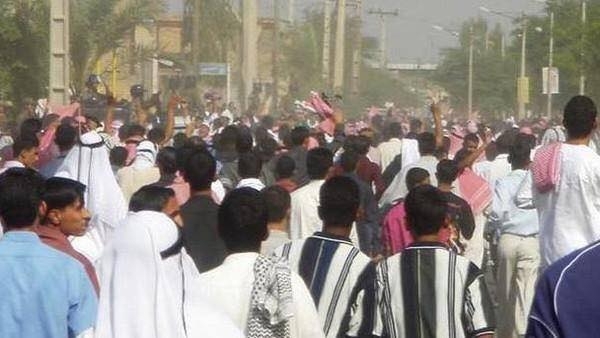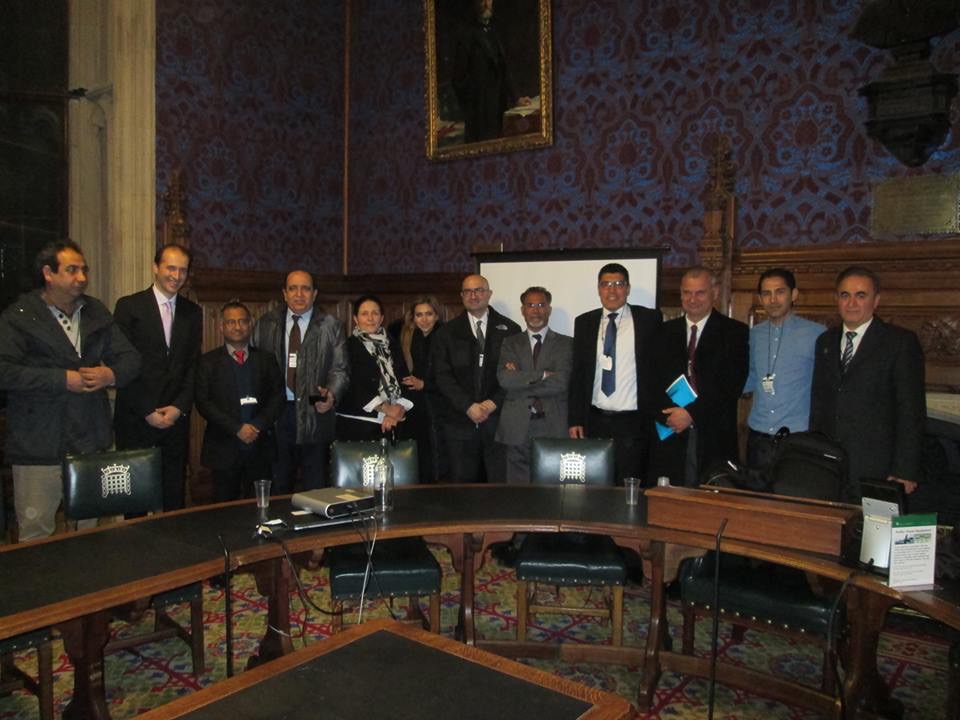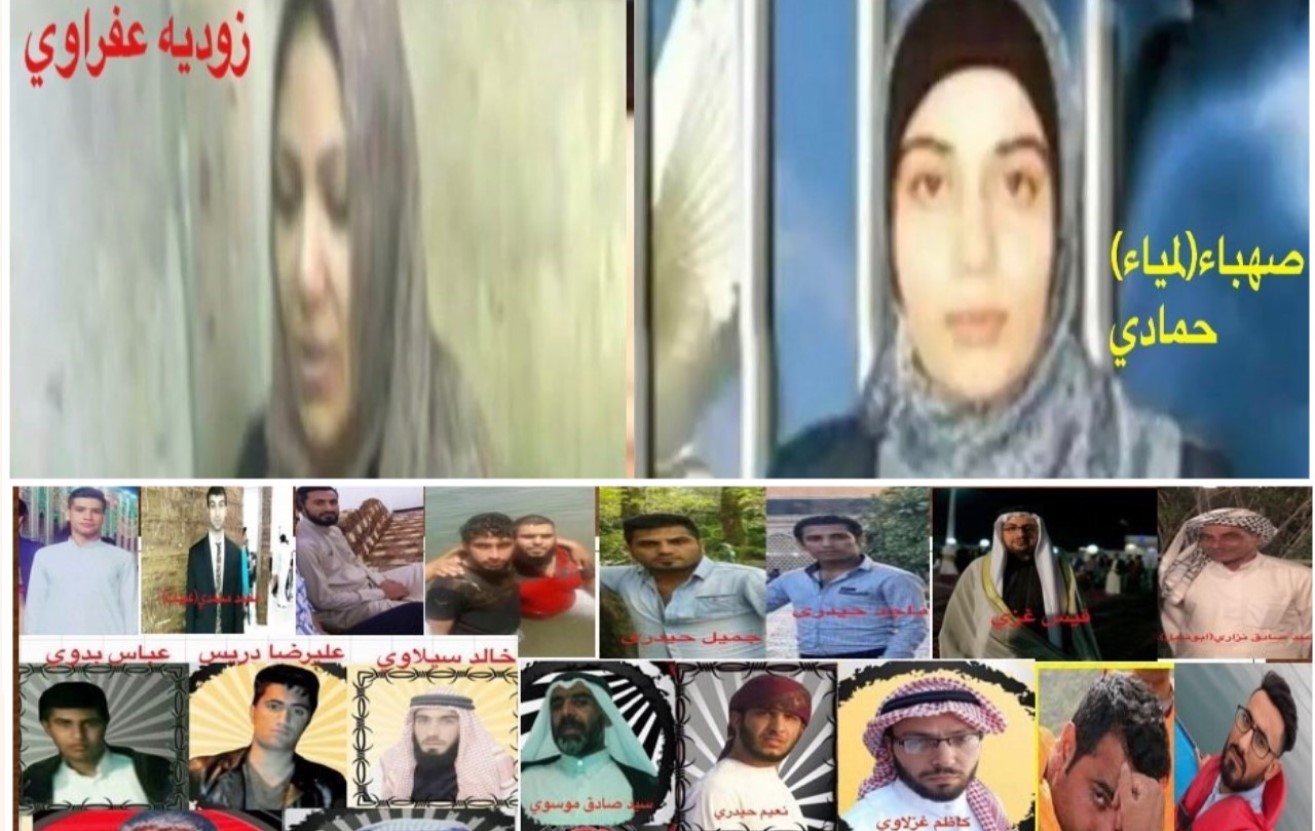Iran's Ahwazi Arab minority: dissent against 'discrimination'
Iran's Ahwazi Arab minority: dissent against 'discrimination'Article by: Mamoon Alabbasi
Saturday 28 February 2015 12:00 UTC
link: click here
The plight of Iran's Arab Ahwazi minority and their recent protests in the country's oil-rich southwest region, is being underreported despite serious and systematic discrimination against them by Tehran, exiled members of the community told Middle East Eye.
Arabs make up the majority of what is officially referred to as the Khuzestan province, but which Ahwazis call "Arabistan", as they use the region's historical name to stress their ethnic roots.
The official Iranian census does not break up the statistics into ethnic backgrounds, but members of the Ahwaz community say they number around 5 million out of Iran's 75 million population.
They are distinguished from another Arab community in Iran, known as the Hula, who live in the country's eastern coast and number around 1.5 million. Unlike the mainly Shiite Ahwazis, the Huwla Arabs are mostly Sunni.
There are also reportedly many Arabs in Khorasan province, and the ethnic group can be found in small numbers in many provinces. Although different Arab communities – as well as other minorities and groups - complain of discrimination, the Ahwazis claim they have it the worst.
Language and identity
The Ahwazis say they are facing two forms of discrimination: the first is with regards to their identity and language, while the second is related to their economic standing – including unemployment, health and environmental problems.
"Imagine, you have children whose first language at home is Arabic, then they would start primary school where they study everything in Persian," Ramadan Alsaedi, a London-based Ahwazi journalist, told MEE.
"They will first have problems in their studies at school, but also later on, as they learn to read and write in Persian, the literacy of their own mother-tongue suffers as they are not taught a single Arabic lesson till they reach intermediate level (around the age of 13)," explained Alsaedi.
"From the intermediate level onwards, Arabs will have access to one lesson per week of formal education, from a curriculum that that imposes the world view of the regime which denies [the Arab students'] own identity," he added.
Many Ahwazis seek to find a way around this by hiring private tutors to teach their children Arab culture as well as their language. However, if caught, these families are reportedly threatened with the severest punishments.
'Vague trumped up charges'
"By law, there is nothing prohibiting learning Arabic outside school hours or owning books of Arabic literature that are not sanctioned by the regime. But in reality, those who are implicated are often tried on vague trumped up charges, whose punishment could reach the death penalty," Yousef Azizi, an Ahwazi writer who now resides in Britain after fleeing Iran, told MEE.
"You could be charged with having 'relations with foreign officials' if you have Arabic books brought from outside Iran, but you may face a life sentence or even the death penalty for accusations like 'spreading corruption on earth' or 'enmity against God', which prosecutors and judges can apply with little need for explanation," said Azizi, who was himself sentenced to five years in prison for various charges, including "propaganda against the regime".
The Iranian constitution says that "the use of regional and tribal languages in the press and mass media, as well as for teaching of their literature in schools, is allowed." However, Azizi and Alsaedi note, application has been the opposite.
Human rights activists, cultural and language campaigners as well as influential poets can find themselves facing the same punishments as dissidents who take up arms against the rule of central government, said Azizi, adding that "the regime's actions are pushing more people towards calling for independence from Tehran, although for the time being most people want more autonomy."
Rich in oil, gas and water resources
The Ahwazis enjoyed self-rule till 1925, when Iran's Shah Reza Pahlavi overthrew the region's Arab ruler, Sheikh Khazaal al-Haj Jabber, and seized total control the province, which today is reportedly the source of over 80 percent of the country's oil and 50 percent of its gas, not to mention its rich water supplies.
"The deliberate drying up of the region's marshes as well as the re-directing of its river waters to other [Persian] areas has left the Ahwazis suffering on many levels, not least of which are fishing and access to drinking water," Amir Saedi, a rights campaigner and a medical graduate based in London, told MEE.
"Iran's water-abundant region cannot irrigate its own farms as the regime's dams channel the river streams away from the use of the locals. The recent dust storm is a direct result of the regime's discriminatory water polices, which has harmed the environment of the province, leading to the worsening of people's health, including a rise in cancer cases," Saedi added.
Ahwaz was ranked by the World Heath Organisation (WHO) as the world's second-most polluted city in 2014, after topping the infamous chart in 2013, although many other Iranian cities suffer from serious pollution. But the official Iranian media response has been dismissive of the country's environmental problems.
The Ahwazis often complain that the region's original inhabitants don't see much of the benefits that their province has to offer, despite being the richest in oil, gas and water in the whole of Iran.
Pollution and unemployment
At the same time, while other regions are having a bigger share of Ahwaz's resources, the local Arabs are suffering the most from the resulting pollution, yet they have less money to pay for medical bills.
"Only 5 percent of governmental posts in the area are held by Arabs. The Arab-majority region has not had an Arab governor since 1925. In one oil-drilling company that had 4,000 employees, it was discovered that only seven of them were Arabs," said Azizi.
"You find jobs vacancies in Ahwaz being advertised outside the province, where Arabs are not even aware of posts available in their own backyard. And those who hear about them and apply hardly get the job anyway," he added.
The peak of the standoff between the government and Ahwazis was in 2005, where militants carried out a number of bombings and the army retaliated with deadly attacks. Two people were convicted the bombings and were hanged in 2006. Today, peaceful protests against discrimination, marginalisation and "imprisonment of non-violent dissidents" continue.
The exiled Ahwazis also spoke of a long-running campaign to change the demographic of the area, where high incentives are given to people from outside the region to work in the province, even though the unemployment figure sometimes hits 37 percent.
Anti-Arab discourse
They also spoke of outright racism at a national level, despite claims by many of the ruling clergy class that they are the descendants of Prophet Muhammad, who is an Arab.
"Other minorities, like the Kurds, Turkmen, Azeris, Baluchis and Lors may face 'national oppression'. But Iran's Ahwazis encounter the additional burden of anti-Arab discourse in the media and in literature," said Azizi.
"Arabs outside Iran don't know about it because this kind of racism does not feature in the regime's Arabic language publications and broadcast, targeting Arab viewers outside of Iran. But we (Iranian Arabs) feel it all the time," he added.
"The regime needs the Arabic language for propaganda purposes and also because a lot of its religious heritage is in classical Arabic. But they don't want the Ahwazis to communicate in their own indigenous language. They even changed the original Arabic names of many of the region's areas into Persian," said Azizi.
Conversions to Sunnism
The perceived crackdown on the Arab identity of the region is leading a growing number of Ahwazi youth to switch to the Sunni branch of the faith, which some of them view as closer to their Arab roots. Iran itself had been predominantly Sunni until Shah Ismail of the Safavid dynasty launched a forced conversion policy in the 16th century.
However, those Ahwazis who are converting to Sunni Islam may be giving the authorities another cause to land them in prison, even though there is no official law that bans changing your sect or religion.
Alsaedi, Azizi and Saedi argue that any identity or belief that falls outside what the ruling class has envisioned for Iran would be severely suppressed, with elastic charges that could be tailored to fit any form of perceived dissent. And to top that, Ahwazis don't have many friends at the top.
"If you don't subscribe for the regime's ideology, you won't even be allowed to run for elections, let alone win," said Saedi, "which is why the Arabs are underrepresented in government. The results are predetermined anyway."
- Details
- Articles










